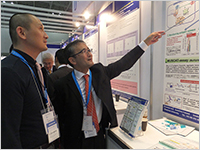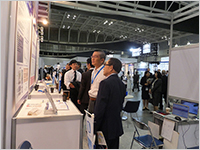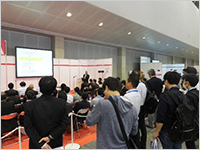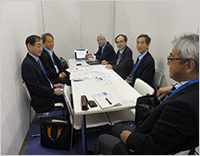Enlarge Image Associate Professor Tani (left) explaining ergothioneine production
Enlarge Image Audience listening to Professor Seno’s presentation
Enlarge Image Okayama University representatives (right side) consulting with medical organization representatives
Enlarge Image
Okayama University participates in Asia’s Biggest Bio-Business Event: ‘Bio Japan 2016’
Okayama University participated in Asia’s biggest bio-business event: ‘Bio Japan 2016 World Business Forum’ held at Pacifico Yokohama on 12-14 October 2017, where it presented the results of advanced research in areas including medicine, drug development, and biomedical engineering, as well as giving details about Okayama University’s Biobank Project, which collects and offers biological samples for research.
Associate Professor Junichiro Futami of the Medical Bioengineering at the Graduate School of Natural Science and Technology, has developed highly sensitive antibody-detecting diagnostic agents for quantifying the degree of activation of tumor immunological response through a simple blood test. He announced that by using this diagnostic agent, it is possible to provide important data for evaluating treatment plan options for cancer immunotherapy, for which there is considerable individual variation.
Associate Professor Akio Tani of the Institute of Plant science and Resources, has discovered that predominant bacterial symbionts (Methylobacterium species) on plant surfaces utilize methanol emitted from plants to accumulate large quantities of ergothioneine (EGT)— a very expensive antioxidative amino acid that animals cannot synthesize. He explained that by using these bacteria, it is possible to produce EGT inexpensively compared with conventional methods using chemical synthesis. EGT has a wide range of potential applications including as a material for cosmetics, and supplements.
Professor Masaharu Seno of the Medical Biomedical Engineering at the Graduate School of Natural Science and Technology, has developed a technique for using normal iPS cells to create cancer stem cells exhibiting a wide range of properties. In to order to verify the validity of his technique, Professor Seno has proposed novel mouse models for cancer to assess potential drug delivery systems and antitumor agents that can be evaluated concurrently with the immune system.
In addition, he presented clinical results of a novel diagnostic and prognostic biomarker for patients with sepsis, and results from molecular targeting techniques using theranostics (Therapy + Diagnosis), and the concept of the Okayama University Hospital Biobank.
At the exhibitor presentation, Okayama University gave six lectures, with a total of 370 people attending the event.
Finally, the University also conducted matching meetings with pharmaceutical companies and medical/pharmaceutical related organizations interested in research at Okayama University, and exchanged views for technology transfer and joint research.
Further information
English page
http://www.okayama-u.ac.jp/eng/news/index_id6356.html
Japanese page
http://www.okayama-u.ac.jp/tp/news/news_id6224.html




